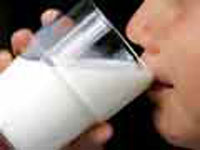Listeria-contaminated milk kills two people in US
By Margarita Snegireva. The pasteurization process at a central Massachusetts dairy connected to a deadly outbreak of a bacterial illness appears to be working properly, a state health official said Friday.

Listeria is a bacterial genus containing six species. Named in honour of Joseph Lister, Listeria species are Gram positive bacilli and are typified by L. monocytogenes, the causative agent of Listeriosis.
Listeria ivanovii is a pathogen of ruminants, and can infect mice in the laboratory, although it is only rarely the cause of human disease.
Dr. Alfred DeMaria, the state director of communicable disease control, said that could mean the listeria bacteria that sickened four people in Massachusetts entered Whittier Farms' milk supply after it was pasteurized. Two of those victims, a 78-year-old man and a 75-year-old man, died in June and October. Another elderly man and a pregnant woman survived, although the woman miscarried.
"My understanding is they did everything right," DeMaria said. "That could happen. You could do everything right and something bad could happen."
The Shrewsbury dairy has suspended operations and is cooperating with state officials trying to pinpoint the source of contamination, DeMaria said. The farm delivered milk mostly to homes in the Worcester area.
Commercial distribution of packaged raw milk is prohibited in most countries. However, 28 US states allow sales of raw milk, and in other parts of the world, raw milk can often be bought direct from the farmer. In England, about 200 producers sell raw, or "green top" milk direct to consumers, either at the farm or through a delivery service. Raw milk is sometimes distributed through a share program, wherein the consumer owns a share in the dairy animal or the herd, and can be considered to be consuming milk from their own animal. In the United States, Arizona, California, and Washington allow raw milk sales in retail stores with appropriate warning labelling.
Subscribe to Pravda.Ru Telegram channel, Facebook, RSS!


